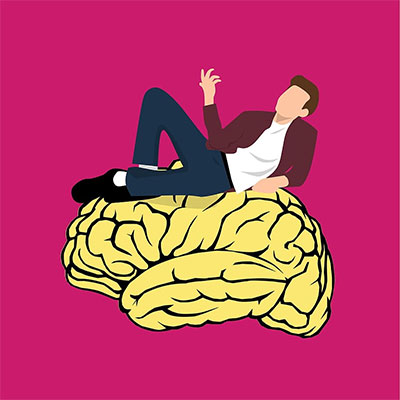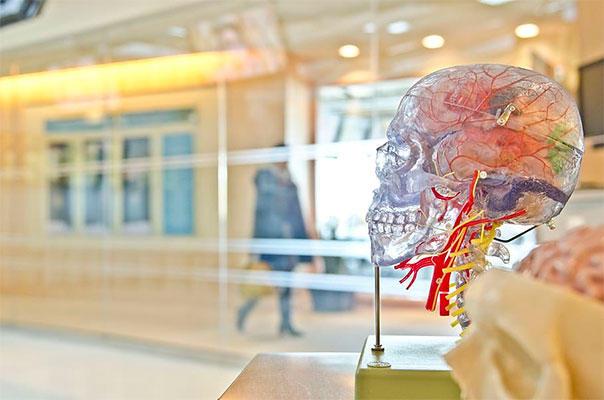What drugs increase BDNF?
Antidepressant drugs, such as SSRIs, increase BDNF (Brain-Derived Neurotrophic Factor) in the hippocampus and PFC. Ketamine rapidly increases BDNF protein levels in the hippocampus. Ketamine does this by eliciting hippocampal potentiation dependent on BDNF expression.
However, you should only be using these drugs if you have a prescription from a doctor and close medical supervision.
By the way, if you’re looking for more ways to increase your brainpower, check out our Best Nootropics page.
Other drugs that can help increase BDNF include:
- Progesterone
- Dehydroepiandrosterone
- Lithium Orotate
Progesterone is a natural steroid in your body that is typically part of the menstrual cycle and pregnancy. However, it can also help with BDNF and brain function.
Progesterone has been seen to help the development of your brain cells, and some research [1] has even seen that it can increase BDNF release.
Whereas Dehydroepiandrosterone (DHEA) is another steroid hormone which is naturally produced in us humans. Your body makes it in the adrenal glands, gonads, brain and it even works as a precursor to other hormones like testosterone and estrogen.
It has neuroprotective qualities and can help in areas such as cognition and memory. However, there’s a study out there that shows that it can also help with acetylcholine levels and BDNF expression. [2]
Lithium is typically used to treat bipolar disorder. However the version that is usually used is Lithium Carbonate not Lithium Orotate.
Lithium Orotate when taken in small amounts may be able to boost BDNF levels [3, 4], and even mood.
There are plenty of options out there in the form of drugs for BDNF.
However, we always recommend that you speak to your doctor, and get a prescription under medical supervision if you need more BDNF.

5 Natural Alternatives to Drugs for BDNF (Brain-Derived Neurotrophic Factor)
Here are the top 5 alternatives to drugs to raise BDNF levels:
- Caffeine
- Omega-3 Fatty Acids
- Prebiotics
- Rhodiola Rosea (Adaptogenic Herbs)
- Theanine
There are plenty of options that you can use instead of drugs to naturally raise your BDNF levels. However, these are the options that we find most effective for getting the job done.
Below, we’ll walk you through each one and give you an idea of how they achieve this.
1. Caffeine for BDNF
Caffeine is quick and easy to take, natural and very affordable. It’s a good one to add to your list of options for BDNF.
Studies have shown that using caffeine can help protect against the risk of developing neurodegenerative diseases.
One piece of research in particular found that caffeine can reduce age-related impairments in memory by increasing your brain’s levels of BDNF [5].
If you’re looking for a good shot of caffeine, check out our Best Energy Pills page.
Good caffeine supplement: Performance Lab Stim
2. Omega-3 Fatty Acids for BDNF
Omega-3 Fatty Acids are great for your health in general. They have been seen to promote mood, memory, learning sleep and even help fight depression, dementia and Alzheimer’s Disease. [6, 7, 8]
A lot of this is put down to their ability to promote BDNF levels. [9]
It’s always a good idea to supplement Omega-3 Fatty acids. Most people have been seen to be deficient in the nutrient, which is unfortunate because it is essential to the electrical functioning of your brain and nervous system.
3. Prebiotics of BDNF
A prebiotic is a substance that your body can’t digest that can pass through to your gut a feed the good bacteria in your bowel.
There are plenty of prebiotic foods out there such as sweet potatoes, onions, carrot, asparagus and more.
However, there are also plenty of prebiotic supplements that can help you bulk up this area too.
The advantage of prebiotics is that the bacteria converts into butyrate which can increase your overall levels of BDNF. [10, 11]
4. Rhodiola Rosea for BDNF
The advantage of herbs like Rhodiola Rosea is that they are adaptogens. These are herbs that can support your brain in dealing with areas like stress, relaxation, energy and more – it’s good at responding to the needs of your body.
Rhodiola Rosea is a great example of an adaptogen that does these things. It has been seen to help fight fatigue and improve feelings of well-being.
Not only that, it’s been seen to increase BDNF expression in your brain. [12]
Good Rhodiola Rosea Supplement: Mind Lab Pro
5. Theanine for BDNF
Theanine is an amino acid that is commonly found in Green Tea and is known to reduce stress and promote wakeful relaxation.
It does not cause drowsiness or fatigue – just relaxation while maintaining high levels of focus. It has even been seen to help handle the jittery effects of the stimulant.
Not only that, Theanine has been seen to help increase your brain’s levels of BDNF. [13]
Summary: What Drugs can increase BDNF?
As you can see, there are numerous drugs out there which can help improve your levels of BDNF.
SSRIs, Progesterone, Dehydroepiandrosterone and Lithium Orotate are all drugs which have been linked to increasing your body’s levels of Brain-Derived Neurotrophic Factor.
However, you don’t have to turn to drugs to raise these levels. There are plenty of natural options that can raise your levels of BDNF too.
Caffeine, Omega-3s, Prebiotics, Rhodiola Rosea and Theanine are all great options to achieve results naturally.
Related articles:
- Vyvamind VS Noocube: What is the better nootropic?
- Is it safe to take Bacopa Monnieri for a long time?
- Vyvamind Review: Is it the best natural focus aid?
- Nooceptin Review: Best Nootropic for Brain Health?
- What is a Nootropic Bar? | Nootropic Snacks & Brain Products
- Modafinil V Adderall
- Valerian (Valeriana officinalis)
- Lion’s Mane (Hericium erinaceus)
- Rhodiola rosea
- Turmeric (Curcuma longa)
- Saffron
- Holy Basil (Ocimum tenuiflorum)
- Ashwagandha (Withania somnifera)
- Rosemary (Salvia rosmarinus)
- Lemon Balm
- Ginkgo Biloba
- Centella Asiatica
- Nootropic Herbs List
- Does Adderall Make You Dehydrated?
- Why do Stimulants Make Me Sleep?
- Does Adderall make you sweat?
- Drugs that increase BDNF | Brain-Derived Neurotrophic Factor
- How long after taking Adderall can I drink Alcohol?
- Can nootropics cause brain damage?
- Does Adderall Make You Poop?
- OptiMind VS Adderall
- Does Adderall make you smarter?
- What are the Negative Effects of Caffeine?
- Should I take Ashwagandha in the Morning or Night?
- What foods contain Citicoline?
- Performance Lab Energy Review: #1 Mitochondria Supplement?
- Performance Lab Stim Review | Caffeine Supplement FAQ
- Mind Lab Pro Review – The Best for Your Brain?
- Performance Lab Mind Review: The Ultimate Stackable Nootropic
References:
[1] Su C, Cunningham RL, Rybalchenko N, Singh M. Progesterone increases the release of brain-derived neurotrophic factor from glia via progesterone receptor membrane component 1 (Pgrmc1)-dependent ERK5 signaling. Endocrinology. 2012;153(9):4389-4400. doi:10.1210/en.2011-2177
[2] Sakr HF, Khalil KI, Hussein AM, Zaki MS, Eid RA, Alkhateeb M. Effect of dehydroepiandrosterone (DHEA) on memory and brain derived neurotrophic factor (BDNF) in a rat model of vascular dementia. J Physiol Pharmacol. 2014;65(1):41-53.
[3] Chuang DM, Wang Z, Chiu CT. GSK-3 as a Target for Lithium-Induced Neuroprotection Against Excitotoxicity in Neuronal Cultures and Animal Models of Ischemic Stroke. Front Mol Neurosci. 2011;4:15. Published 2011 Aug 9. doi:10.3389/fnmol.2011.00015
[4] Chiu CT, Wang Z, Hunsberger JG, Chuang DM. Therapeutic potential of mood stabilizers lithium and valproic acid: beyond bipolar disorder. Pharmacol Rev. 2013;65(1):105-142. Published 2013 Jan 8. doi:10.1124/pr.111.005512
[5] Sallaberry C, Nunes F, Costa MS, et al. Chronic caffeine prevents changes in inhibitory avoidance memory and hippocampal BDNF immunocontent in middle-aged rats. Neuropharmacology. 2013;64:153-159. doi:10.1016/j.neuropharm.2012.07.010
[6] Wibrand K, Berge K, Messaoudi M, et al. Enhanced cognitive function and antidepressant-like effects after krill oil supplementation in rats. Lipids Health Dis. 2013;12:6. Published 2013 Jan 25. doi:10.1186/1476-511X-12-6
[7] Logan AC. Omega-3 fatty acids and major depression: a primer for the mental health professional. Lipids Health Dis. 2004;3:25. Published 2004 Nov 9. doi:10.1186/1476-511X-3-25
[8] Sampalis F, Bunea R, Pelland MF, Kowalski O, Duguet N, Dupuis S. Evaluation of the effects of Neptune Krill Oil on the management of premenstrual syndrome and dysmenorrhea. Altern Med Rev. 2003;8(2):171-179.
[9] Kumar PR, Essa MM, Al-Adawi S, et al. Omega-3 Fatty acids could alleviate the risks of traumatic brain injury – a mini review. J Tradit Complement Med. 2014;4(2):89-92. doi:10.4103/2225-4110.130374
[10] Savignac HM, Corona G, Mills H, et al. Prebiotic feeding elevates central brain derived neurotrophic factor, N-methyl-D-aspartate receptor subunits and D-serine. Neurochem Int. 2013;63(8):756-764. doi:10.1016/j.neuint.2013.10.006
[11] Kim HJ, Leeds P, Chuang DM. The HDAC inhibitor, sodium butyrate, stimulates neurogenesis in the ischemic brain. J Neurochem. 2009;110(4):1226-1240. doi:10.1111/j.1471-4159.2009.06212.x
[12] Yang SJ, Yu HY, Kang DY, et al. Antidepressant-like effects of salidroside on olfactory bulbectomy-induced pro-inflammatory cytokine production and hyperactivity of HPA axis in rats. Pharmacol Biochem Behav. 2014;124:451-457. doi:10.1016/j.pbb.2014.07.015
[13] Miodownik C, Maayan R, Ratner Y, et al. Serum levels of brain-derived neurotrophic factor and cortisol to sulfate of dehydroepiandrosterone molar ratio associated with clinical response to L-theanine as augmentation of antipsychotic therapy in schizophrenia and schizoaffective disorder patients. Clin Neuropharmacol. 2011;34(4):155-160. doi:10.1097/WNF.0b013e318220d8c6
Hi, I’m Pablo Garduno. I am a biohacking enthusiast, and Head Writer of SanDiegoHealth.org. I write the majority of the content on this site, and appreciate you taking the time to read my work.

